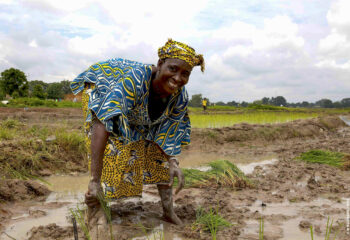My name is Ténin Kone. I am a widower and the head of a household of 11 people, including six teenagers, who look to me for food, healthcare and tuition. Our livelihood depends entirely on fonio, a crop grown here in Mali. But the fonio does not always grow as we need it to. Sometimes, the land lacks the nutrients needed for a healthy crop. IFDC has taught us that to replenish the land, a combination of manure-based and chemical fertilizers must be used – a combination that costs more than my daily budget will allow. Our land may be poor but we are not.
The fields might be sparse at times, but yield has been improving. Some two or three years ago, an organization called AID-SA taught me and 230 other farmers how to better cultivate fonio. They educated us on the use of organic manure, organizing stones to divert floodwater, row planting techniques and different varieties of fonio seeds. I myself produced 7 bags per hectare two years ago and 8 bags per hectare last year – a huge improvement from previous harvests. But better produce is not always enough; we also need better sales.
I found myself going from 7-8 bags per hectare all the way up to 16 bags per hectare!
From there, I became a member of Jigi Cooperative with the help of IFDC. The cooperative taught me the importance of meetings. Through coming together and networking with AID-SA, our cooperative has negotiated 300 CFA francs per kilogram of fonio, instead of 200 CFA francs in previous years. Being able to negotiate a better price hasn’t been the only benefit IFDC and Jigi Cooperative have afforded me. They showed me how to combine organic fertilizer with chemical fertilizer for a better output. I found myself going from 7-8 bags per hectare all the way up to 16 bags per hectare! There is just one problem: the fertilizer is currently too expensive for someone like me to purchase.
…there is still hope.
Even obtaining access to fertilizer can be difficult. The village in which I live, Défina, is small and removed from society, with roads that trucks dread. Our isolation greatly increases transportation costs of fertilizer. Even if I sold all of my fonio production, it would not be enough to assume all my expenses and purchase all the fertilizer I need for my 4 hectares, and that’s not even counting field plowing costs. However, there is still hope.
As I said, we are not poor. It is our land that became poor. If we find how to pre-finance the purchase of fertilizers, nothing will be like before. So we will multiply meetings, for where there are meetings, there is always a way – that is to say, hope.
Tenin’s story is part of our “Building Foundations for Female Entrepreneurs” series.




